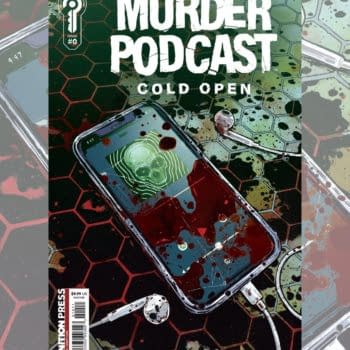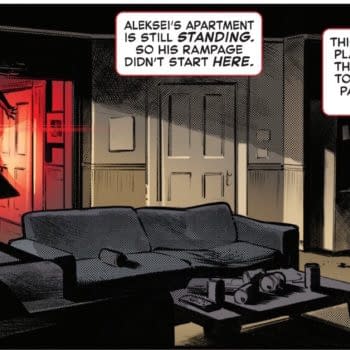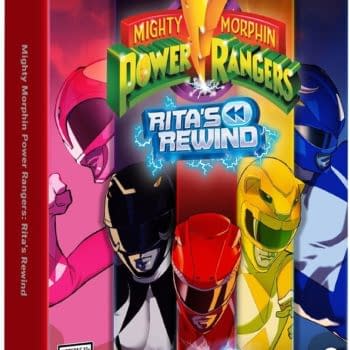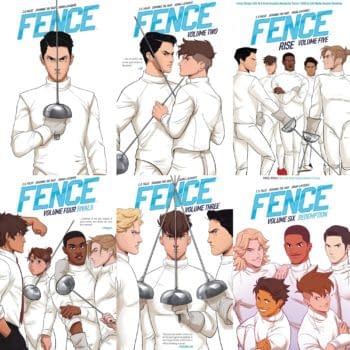Posted in: Recent Updates | Tagged:
Shakespearean Scholar (And Frank Miller's Girlfriend) Blasts KILL SHAKESPEARE

Kimberly Cox is a New York Shakespearean scholar of note. She also happens to be the partner of graphic novelist and movie director Frank Miller (The Dark Knight Returns, Sin City, 300) and even appeared in the Spirit movie (albeit briefly).
So who better to ask about the comic book from IDW coming out this week, Kill Shakespeare, in which the characters of Shakespeare's plays cross from one to another, in an attempt to track down the evil wizard who created them all.
So I did. And she's not happy. But I also asked two other experts, Ben Crystal and Joe Gualtieri, who had a very different view.
But ladies first. Kimberly writes;
I have studied the history and work of William Shakespeare for decades. It is with tremendous agony that I write what I must at this moment but I would be betraying my own personal beliefs if I did not. And to you, dear reader, I only ask that you bear with me and take note of what I have to say. For this, I will be exceedingly grateful.
Oh for a muse of fire that would ascend,
The brightest heaven of invention
A Kingdom for a stage, princes to act
monarchs to behold the swelling scene!The opening to Henry V begins with a wish for an ideal setting to present the play to the audience. For then, you will experience the production and the story it intends to tell, as the writer and creators imagine.
But pardon, and gentles all,
The flat unraised spirits that have dared
On this unworthy scaffold to bring forth
So great an object:But Shakespeare knows that despite how clever he may be, he cannot possibly capture the actual thrill of the history upon which his play is based. Therefore, he immediately asks for the audience's forgiveness for the faults that will inevitably ensue from trying to tell a story based on a historical event or subject. At least he cared to admit it. Most people who successfully pull off something so challenging, do admit this. The people who utterly fail at the attempt, don't even think to admit this. Why? Because in order to tell a story, successfully, based on history, you must know something about said history. Specifically, you have to actually do your homework. If you decide you are smart enough to bull shit your way through it, you will end up with exactly that: bull shit.
Everyone hates Shakespeare. I know it. You know it. So, let's move on.
WHY does everyone hate Shakespeare?
Because if you don't know what you are doing and you try to produce one of the plays or teach it to students in school, the experience is utter torture. No one will understand it. No one will care to try and understand it. No one will be able to explain why it's so bad, it just is. Effectively, this is what has been killing Shakespeare ever since the first quarto was published and what is still killing his works today. You really have to know Shakespeare in order to do Shakespeare.
There are so many BAD manifestations on the subject, it pains me to even discuss it. From a Harvard scholar's book to a community theatre production of JULIUS CAESAR to how students are forced to read ROMEO AND JULIET in school.
And now a BAD comic book?
SMH. #%$&@!!!????
I am shaking my head. I want to cry. I want to bitch slap whoever was involved with creating it. However, this kind of crap is nothing new. There is nothing I can do about it except hope that somewhere, someday, it inspires ONE person to go and discover how awesome the work of William Shakespeare is and how even more awesome the history behind this iconic figure is. But the comic book is seriously so poorly done, so flawed on even the most elementary levels of story-telling, I cannot imagine it doing anything but alienating even more people.
Come on, the villain tells the hero his task is to steal Shakespeare's Quill?
I just threw up in my mouth.
I'm not going to bother with explaining the basic flaws. You can find out for yourself and then throw-up in your own mouth.
KILL SHAKESPEARE. (What irony. Is this someone's idea of a bad joke? Really, I'd like to know because throwing up in your mouth is not fun and really gross.) This is an ironic title for a comic book that seeks to use the subject of Shakespeare as its main premise. It could be really funny but I'm not laughing.
Oh, they think they are so clever. They must, because otherwise, this comic book would not exist. IDW would never have even considered the proposal. But no one at IDW knew a thing about Shakespeare, that much is clear, because I doubt that they want to publish a giant stinking turd of a comic book on purpose.
These guys really are helping to kill Shakespeare. This time, for comic book readers. Besides, KILL KING ARTHUR doesn't sound as good, anyway.
Oh, dear reader, how can I now begin
To tell the tale of woe that I must tell.
Alas, the words with bitterness, must sin;
Deceive the truth of what awaits in Hell.Unless a man has been himself to see,
He cannot know how much our words deceive.
I wish the more my honesty to thee
Would not be such that leaves these men to grieve.But wait, the curse on them comes not from I,
Who knows too well the prophecy itself,
For they alone did dare to risk it–Why?
The arrogance of men, the weakened self.Forgive the fact that now you must thus hear
Another rant and tale about Shakespeare.Can you guess who wrote that? I did.
Why in the world would a person bother to do such a thing? To prove it can be easily done if you know what to do.
Under duress and under a deadline, I can write exactly in the same meter and syntax as the Bard. It's not so difficult once you study enough of the text. So why the FUCK could these guys not even bother to try it in their comic book? Because they thought they could bullshit their way through it and so, they never bothered to do their homework. Consequently, they ended up with absolute crap.
Next time, do your research guys. You could have realized a really awesome idea.
You wasted time. Now, time doth waste you. Bolingbroke's jack of the clock!
–For all who care to know, I am referencing RICHARD II.
–It's not hard to take Shakespearean text and put it into modern context.
–But again, you actually have to have read the text first.
Not every Shakespearan expert has been so unkind however. Actor Ben Crystal, who has appeared in both The Comedy of Errors and Titus Andronicus at The Globe in London (natch), and author of the acclaimed Shakespeare on Toast writes;
First off, I think it's *beautifully* drawn. Reminds me of Hellboy, particularly the ghosts and witches. It looks great, has a good pace, and is exciting to read. I like the story too: it's a nice twist – one I'd been toying with for a while – and it left me wanting to read more.
The language is a bit of a tricky one. For the most part, it works well. There's an error here and there (page 14 should say 'thou art' not 'thou are'), but those aside, I think it falters when the writer tries to attempt a mock-Shakespearean style. The opening speech, and the flashbacks to Polonius' death are neither one thing nor t'other. 'Thou wretched, rash, intruding fool… I took thee for thy better' is no more difficult to understand than 'You wretched fool… I thought you were my better' – and the first version, using the original text, is more in keeping with the style of the rest of the piece.
For me, this mixture of original text and bits of modernised 'translation' doesn't seem to work so well. I'd say it'd be better to use the original text – this half-way-house approach jars. But then I know I would say that.
Later in the tale, the style seems much freer, more playful, and works much much better. The writing is a much more believable mix, a nice idea of what Shakespearean/Elizabethan colloquial speech could be. I suppose what I'm saying is that the more formal text sounds a bit fake. Might be worth mining the plays for appropriate equivalent text to use in their place?In general, though, it's pretty hard to fault. There are a bunch of Shakespeare graphic novels out there, some Manga-style, some with a modernised text, some with the original text, some in-between, but generally they're aimed at teens studying Shakespeare. They're not stupid, and they see them for what they are: an attempt to trick people into Shakespeare. What I like about Kill Shakespeare is that they're using the plays as a starting point to develop another story – much like Shakespeare did. In so doing, it might tease people who normally wouldn't touch a Shakespeare play with a barge-pole, into going to see or read one. Whatever adaptation or translation faults you could lay at its door, its a great idea and, if they fix the text problems I mentioned earlier, can only do good.
And British Rennaissance dramatic expert Joe Gualtieri tells me;
Setting the story during the gap between the fourth and fifth act of Hamlet is a lovely idea, and presumably in a way solves the age problem in the play (assuming a patriarchal line, if Hamlet is 30 as is mentioned in Act 5, why wasn't he made king when his father died? Scholars have been trying to solve this problem for years, even suggesting that Shakespeare Denmark was matrilineal instead) as he ages out of time while having this adventure. Trying to kill one's creator could also explain why Hamlet's "antic disposition" seems to have gone from fake to real by the time he reappears in Denmark.
The relationship between Hamlet and Rosencrantz and Guildenstern as shown in the comic doesn't reflect the original text at all. Hamlet's disdainful of them and they're nothing but toadies to Claudius. There's a strand of critics who've taken them not be Hamlet's friends at all, but merely fellow students. Hamlet seems off otherwise, too. As grim a the play can be, Hamlet is hilariously funny and he didn't make one joke in the entire comic. The three witches seem too involved with Richard's plot; in Macbeth they talk and that causes Macbeth's mind to make its own conclusions.
Richard's offer to Hamlet is an interesting one. While Hamlet's issues with his father dominate the play, it's also very concerned with Christian values. Hamlet's father speaks of being condemned to Hell because he died without being confessed, and as controversial as Hamlet's delay in killing Claudius has been over the years, the text offers up a simple and believable reason- Hamlet does not want to kill Claudius after he's prayed, as Hamlet does not want his uncle to get into heaven. However, this is Hamlet post-act four; his final line in that act was"my thoughts be bloody or nothing worth." The Hamlet in act five is far more task-orientated and seems to have mostly resolved his issues with typical masculine roles (as represented by his father). It's possible that Hamlet would be far more willing to deal with witches and the black arts, but somehow, I doubt it.
The comic is enjoyable enough on its own, but it's definitely not enhanced by having anything beyond a passing familiarity with the original texts, at least not so far.
When asked for comment, especially regarding Kimerley's view, the creators of the series Conor McCreery, Anthony Del Col replied,
We, as the creators of Kill Shakespeare, really appreciate the views of these scholars and enjoy the discussion points that they bring forward. We've done a great degree of research into the stories and characters and have been quite faithful to them and think that our project is one that Shakespeare himself would appreciate (as he himself was an adapter of other's stories). We're glad that we're provoking debates on Shakespeare's work – if everybody loved us we wouldn't consider that we were doing a good job.
Kill Shakespeare #1 is published on Wednesday in the USA and Friday in the UK. Shakespearean scholar or not, do let me know what you think…













